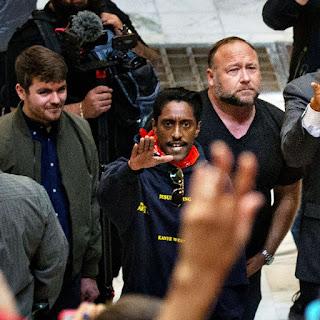
Ali Alexander
The Congressional Committee investigating the Jan. 6 attack on the U.S. Capitol has issued a subpoena for Alabama-connected right-wing extremist Ali (Akbar) Alexander. From a report at Politico:
The Jan. 6 select committee on Thursday (10/7) subpoenaed Ali Alexander, a key figure behind the “Stop the Steal” movement that aided former President Donald Trump’s effort to overturn the 2020 election.
The subpoena, one of three issued Thursday by the House panel investigating the Capitol attack, targets a divisive hard-line conservative who had regular communication with Trump allies, including some congressional Republicans, in the crucial weeks after President Joe Biden's win.
“The rally on the Capitol grounds on January 6th, like the rally near the White House that day, immediately preceded the violent attack on the seat of our democracy,” Chair Bennie Thompson said in a statement on the committee's third round of subpoenas, referring to the "Stop the Steal"-sponsored event that metastasized into a riot.
“Over the course of that day, demonstrations escalated to violence and protestors became rioters. The Select Committee needs to understand all the details about the events that came before the attack, including who was involved in planning and funding them. We expect these witnesses to cooperate fully with our probe.”
The subpoenas go well beyond Alexander, who has a criminal record and once was known as Ali Akbar:
In addition to Alexander, the subpoenas target Nathan Martin, another organizer of the pre-insurrection rally, and the Stop the Steal organization. A previous round of 11 subpoenas targeted other Trump allies who helped organize various events in the run-up to the Jan. 6 attack on the Capitol. And four close Trump associates — including former White House Chief of Staff Mark Meadows — are facing a subpoena deadline to turn over documents to the committee.
Martin and Alexander have two weeks, until Oct. 21, to respond to the panel’s demand for documents. The committee set an Oct. 28 deposition for Martin and a Oct. 29 deposition for Alexander, while the group Stop the Steal has one week to produce documents.
Martin confirmed receipt of the subpoena but declined to comment.
Alexander said in a since-deleted video that he worked with Reps. Paul Gosar (R-Ariz.), Mo Brooks (R-Ala.) and Andy Biggs (R-Ariz.) to attempt to use Congress’ Jan. 6 session certifying Biden’s victory as a chance to pressure lawmakers to overturn the electoral results.
“We four schemed up to put maximum pressure on Congress while they were voting,” Alexander said in the video.
Alexander reportedly has been in hiding since Jan. 6, so it is unknown if he actually will appear before the committee:
It’s unclear if any of the subpoena recipients intend to comply with the committee’s orders.
Trump has directed Meadows and other close aides to defy the committee’s demands, a likely precursor to an intense legal battle to force them to cooperate. Trump himself intends to block the National Archives from sending his former White House’s records to the committee, which promises to ignite another significant court fight.
Some watchdog and civil rights groups had raised concerns about the panel’s plans to seek information from those related to organizing the rallies. The Project on Government Oversight sent a letter to the committee on Tuesday urging them to use caution with individuals’ private data.
“While claims of election fraud were baseless and have seriously undermined public faith in our democracy, false and grossly offensive speech is still constitutionally protected. Accordingly, we urge the committee to be especially cautious in its demands for records that could implicate First Amendment rights or set precedent for future demands that chill First Amendment-protected activities,” wrote POGO executive director Danielle Brian.
